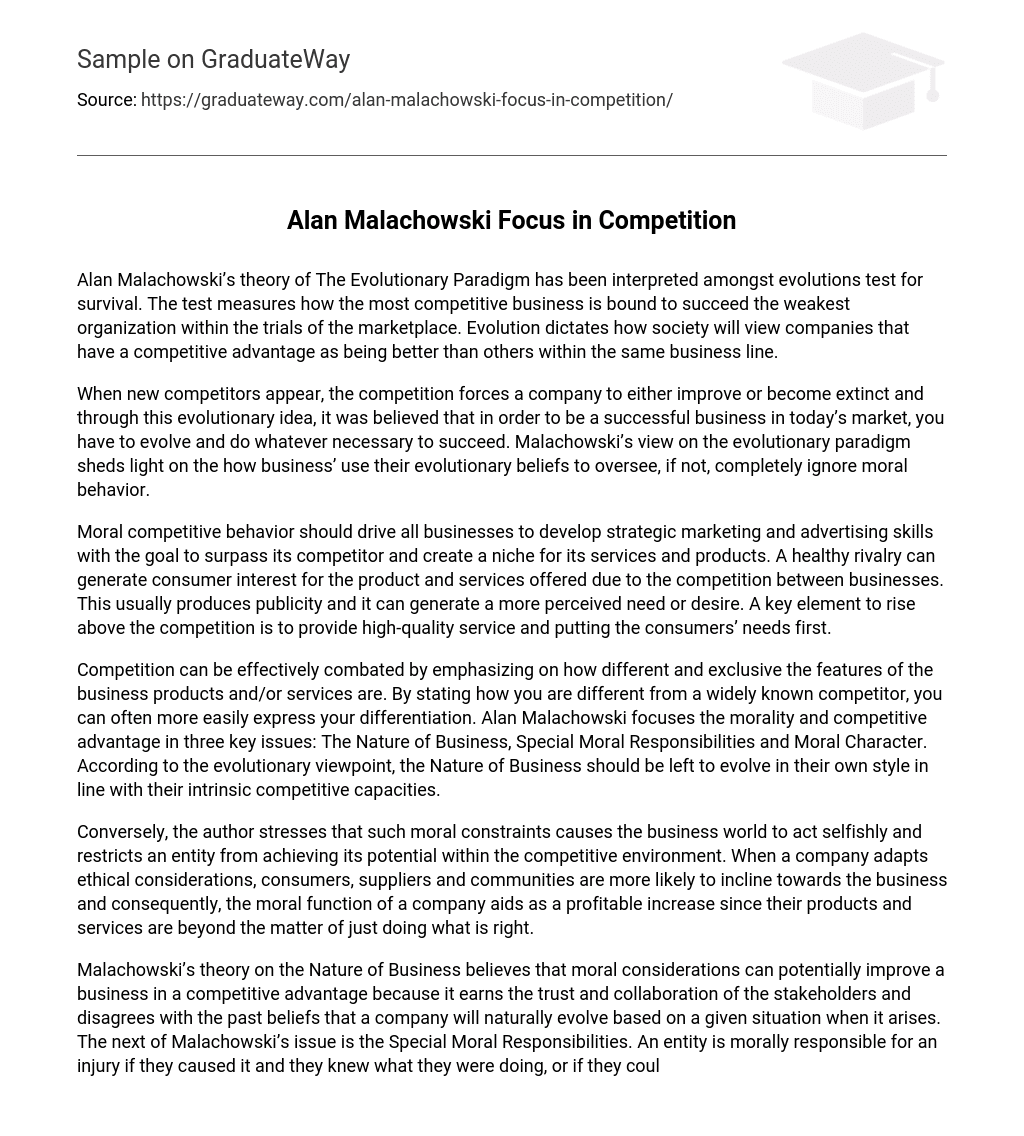Alan Malachowski’s theory, known as The Evolutionary Paradigm, focuses on the survival test of evolution. This test determines that in marketplace trials, the most competitive business will prevail over weaker organizations. According to this theory, society views companies with a competitive advantage as superior to others in the same industry.
When new competitors emerge, companies are compelled to either enhance their performance or face extinction. This evolutionary concept suggests that in order to thrive in today’s market, businesses must adapt and take necessary measures to succeed. Malachowski’s perspective on the evolutionary paradigm highlights how businesses employ these beliefs to oversee or disregard moral behavior.
The motivation for ethical competition should lead businesses to cultivate strategic marketing and advertising abilities in order to outperform competitors and establish a unique position for their offerings. Healthy competition can generate consumer fascination with the products and services provided due to rivalries between companies. This typically generates publicity and can increase the perceived necessity or desire. Delivering exceptional service and prioritizing consumer needs are crucial components in outshining the competition.
One way to combat competition is by highlighting the unique and exclusive features of your business products and/or services. By emphasizing how you differ from a well-known competitor, you can better express your distinctiveness. Alan Malachowski addresses the morality and competitive advantage related to three important factors: The Nature of Business, Special Moral Responsibilities, and Moral Character. According to an evolutionary perspective, businesses should be allowed to develop their own style in line with their innate competitive abilities.
Contrarily, the author highlights the negative consequences of imposing moral restrictions on businesses, stating that it hinders their potential in a competitive setting and promotes a self-centered mindset. Nonetheless, if a company adopts ethical principles, it draws in customers, suppliers, and communities who are more likely to support the business. Consequently, the company’s moral obligation becomes a valuable advantage as its offerings surpass mere adherence to moral norms.
Malachowski proposes that the Nature of Business theory implies that ethics can improve a business’s competitive advantage by earning trust and cooperation from stakeholders. This theory challenges the idea that a company will naturally adjust to circumstances as they occur. Another element of Malachowski’s theory is the notion of Special Moral Responsibilities, which states that an entity is morally accountable for causing or permitting harm if they were aware of their actions or could have prevented it.
In the last 20 years, companies in different sectors like apparel, toy manufacturing, electronics assembly, and pharmaceuticals have faced public criticism for being morally responsible when their suppliers cause harm to third parties. Even if these companies did not directly engage in wrongdoing, they are considered accountable for the mistreatment caused by their suppliers. Despite efforts made by many companies to prevent such harm through onsite inspections, there are occasions where products do not meet their intended purpose and end up harming consumers.
In such situations, it is the duty of the organization to initiate a product recall and compensate customers for their expenses. This action is viewed as morally responsible by stakeholders. Malachowski also highlights the importance of moral character and its significance within organizations. The Evolutionary Paradigm suggests that prioritizing greed and self-interest can lead to financial gains and competitive advantages. However, having a strong moral character is seen as a disadvantage as it can result in reduced productivity.
Malachowski has a positive view of the concept of moral character, as it can encompass various attributes like loyalty, integrity, and honesty. Society believes that the relationship between business practice and moral character is a significant factor in determining whether good or bad actions are performed. Each action typically arises from an external circumstance, often in the form of a sensory experience. If a business lacks morality and only focuses on gaining benefits without considering human character, it can eventually impact individuals’ personal lives too.
Conclusively, I concur with Alan Malachowski’s essential concerns regarding morality and ethical conduct in business competition. Adhering to a moral code of conduct assures me that a company’s goods and services are trustworthy, secure, and reliable. Companies that prioritize moral ethics and behavior not only develop a strong corporate reputation but also enhance their competitive edge by garnering stakeholder support during challenging times.
The organizations benefit from their value in the marketplace and the preference of consumers to do business with them, even when other companies offer similar costs and quality. If a main customer highly recommends an organization, potential customers and suppliers are more likely to trust the company’s ability to negotiate and provide fair trading terms. Lastly, Malachowski’s theory of including moral character in today’s business world involves demonstrating respect, gratitude, and excellence in business practices towards stakeholders.





